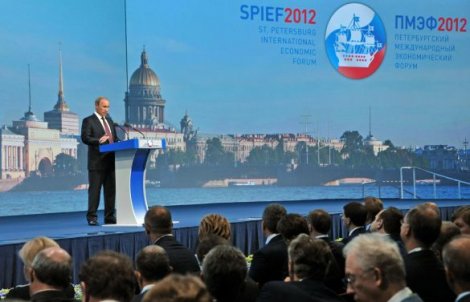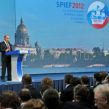
Stagnating Russian Economy Is Officially Invincible to Crisis
Publication: Eurasia Daily Monitor Volume: 9 Issue: 120
By:

Economic preaching and demagogy shaped debates in Russia last week as President Vladimir Putin partook in the G20 summit in Los Cabos, Mexico, and Prime Minister Dmitry Medvedev attended the UN Conference on Sustainable Development hosted by Brazil. At the same time, the St. Petersburg International Economic Forum (SPIEF) granted many ministers in the new Russian cabinet an opportunity to present their ambitions and limitations. Putin kept a low profile at the Los Cabos event, knowing that his key concern about the global slowdown causing a sustained decline in commodity prices is not widely shared among the great and nearly-great powers (Gazeta.ru, June 20). His tete-a-tete with US President Barack Obama was useful but not that promising, confirming that a personal chemistry is not going to emerge (Nezavisimaya Gazeta, June 21). Medvedev made a modest contribution to the failure of the unruly gathering in Rio de Janeiro, arguing against bureaucratic regulation of ecological standards and denouncing “green protectionism” (Kommersant, June 23). Russia’s domestic forum, however, has provided some food for economic and political thought.
It is often called the “Russian Davos,” though in fact the SPIEF has acquired “presidential” status only in 2005 in order to put an end to the popular Russian Forum in London that was too independent-minded for the Kremlin’s taste. The agenda of discussions in St. Petersburg is tightly controlled, and the main purpose has always been to demonstrate loyalty and subservience of big business to the ruling bureaucracy (Kommersant-FM, June 22). Lavish banquets are traditionally a key ritual of this “business socializing,” and this year governor Georgy Poltavchenko staged an outdoor reception at which small girls painted with silver color were placed as “statues” around a pool; the guests were entertained by this performance, but the blogosphere was not (RBC.ru, BestToday, June 22). Putin’s address was supposed to be the high point of the forum, and he delivered an upbeat, if rather dull, assessment of Russia’s economic performance that sought to quash any questions about the firmness of his leadership (Forbes.ru, June 21).
Putin insists that Russia is on track for moderate but steady growth, secured by the healthy posture of its finances and low sovereign debt. This self-complimentary assessment increasingly departs from reality, and former presidential adviser Andrei Illarionov argues that a careful examination of official statistics proves that technically the economy is already in recession (Moscow Echo, June 22). This argument remains to be proven. But Finance Minister Anton Siluanov’s confession that raising the oil price estimate to $115 per barrel (following Putin’s instruction) had failed to perfectly balance the budget – and that the deficit will reach 1.5 percent of GDP – is a reluctant reckoning with reality (Lenta.ru, June 23). The only fragment of good economic news is the slight slowdown in capital flight from Russia to about $6 billion in May, which brings the total for 2012 close to $50 billion. Though the main cause of this reduction has been the decline in petro-revenues (Gazeta.ru, June 21).
Oil indeed remains the single most important driver in the Russian economy. And despite the persistent profiling of nanotechnologies and “risk-free” investment funds in St. Petersburg, the SPIEF sessions that focused on energy were the main attractions to the forum attendees. Former Deputy Prime Minister Igor Sechin captured much attention saying next to nothing. However, his ability to influence key decisions in his new position as secretary of the presidential commission on strategic development of fuel and energy sector is quite probably seriously over-estimated (Vedomosti, June 22). Sechin is set to manipulate the privatization of Rosneft, and there is more to this lucrative deal than just enriching a group of loyalists and creating a new form of state control over the oil business. He is the key figure responsible for executing Putin’s idea about asset swaps with Western majors that should provide legitimacy to the fortunes of his courtiers. Rosneft, for that matter, has successfully removed the taint from dismembering the oil company Yukos owned by Mikhail Khodorkovsky through several recent deals with ExxonMobil and others (Moscow Echo, June 22). Gazprom is less successful in cultivating such “special partnerships,” but its spending spree on assets in Europe serves the same purpose (Gazeta.ru, June 22).
There is another hidden message in Putin’s new emphasis on privatization of state property and in his subtle reminder that closeness to the Kremlin remains the best guarantee of success in business (Kommersant-FM, June 22). He seeks to reassure the Russian mega-rich that they stand to win in economic turmoil under his benevolent protection and tries to dissuade them from spreading their bets and giving money to the “white opposition.” Doubts in the soundness of his leadership were thick in the coffee-breaks and nightcaps of the St. Petersburg Forum, and former Finance Minister Aleksei Kudrin intends to capitalize on them at the conference of his Committee for Civic Initiatives this week (Moskovskie Novosti, June 22). Putin’s personal preference may be for squashing the opposition, but he understands that “big money” would not support such tactics and that the business leaders want Russia to avoid emulating the authoritarian regime of Belarusian President Alyaksandr Lukashenka, who is perfectly happy to embrace European ostracism. Putin tries to dispel their doubts by indicating a readiness to open a dialogue with the “reasonable” groups in the opposition and hinting that only he can hold in check the repressive instincts of the siloviki (Nezavisimaya Gazeta, June 22).
Putin’s proposition about an “effective formula for a national model of democracy and development” attempts to satisfy both the liberals, who believe in the merit of change, and conservatives, who want more of the same. In fact, the former increasingly acknowledge that Putin’s system of power is too rigid to allow any change, and the latter arrive at the conclusion that the pattern of bureaucratic predation is unsustainable. Putin is adept in putting on a business-friendly face and counts on investor’s short memory and desperate desire to find an “island of stability” for their money. But no amount of deceit can disprove the axiom that kleptocracy can be effective only for a short time in exceptional circumstances. Big business is a natural counter-revolutionary force, and so it is dismayed that Putin is deliberately shutting down all channels of peaceful change, creating a deadlock from which the only exit is marked with the “R-word.”




